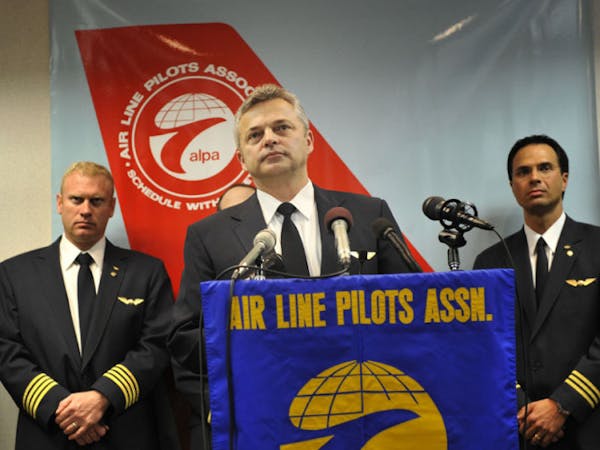The summer travel season could hold especially high stakes for the airline industry this year.
Most analysts believe the nation's major airports could see repeats of 2007's record flight delays, detours and cancellations. The Federal Aviation Administration recently singled out Minneapolis-St. Paul among a handful of airports that it believes could be especially prone to backlogs because of crowded flight schedules.
But this year those delays could take place against the backdrop of executives from Northwest Airlines and Delta Air Lines telling Congress and the Department of Justice why they should be allowed to merge. In that event, the executives likely would have to explain why scenes of people sleeping on top of their luggage will become a thing of the past, rather than a fixture of the future.
How bad could it get during the peak travel season?
"This summer should be like any summer, unpleasant and ugly. Stay home," said Michael Boyd, an airline analyst based near Denver.
It could be worse if the unions at Northwest or other airlines take out frustrations with proposed deals while on the job.
United and Continental are reported to be eyeing a deal, too.
Airline consultant Patrick Murphy Jr. thinks that employees of Northwest and Delta are unlikely to be disruptive, whether by staging sick-outs or other actions.
"I think employees are smart enough to realize that's not going to be useful," said Murphy, a partner in Gerchick-Murphy Associates, a Washington-based airline consulting firm.
But that view isn't unanimous.
Airline consultant Adam Pilarski said that as details of the Delta-Northwest pact come out, for example, some employees might decide they'll be losers in the deal.
"Once you find out what it will entail, you may start getting annoyed with management," said Pilarski, who is with the Avitas consulting firm near Washington, D.C. "Since you can't take it out on management, you take it out on the flying public."
Pilot issue may hurt in long run
The inability of Delta management to get Northwest pilots to approve the merger agreement ahead of time, and the decision instead to reach a pact solely with the Delta pilots, could pose a similar threat.
"Making a deal with one pilots group and not with another, that's innovative," said airline analyst Michael Boyd. "That's like bringing your ex-wife to your wedding. Smart."
If pay disparities and seniority issues between the Delta and Northwest pilots fester and continue into the actual merger, that would pose a longer-term problem, Boyd added.
"The danger is ending up with a merged airline in three years with cockpits that resemble the Hatfields and McCoys," he said.
Delta and Northwest managements will be in the spotlight not just for their deal, but because they dominate two of the nation's most important airports. Atlanta's Hartsfield International is routinely at the top for traffic totals, while Minneapolis-St. Paul International is ranked 13th by the Federal Aviation Administration.
Last year, more than 120 million passengers stepped onto planes operated by Delta and Northwest.
The FAA noted that Northwest had 56 scheduled departures in one 15-minute window, a pace nearly triple capacity, in recent comments to Congress.
Airlines can't look way ahead
With the two companies now in high gear to sell their merger to the government, Delta and Northwest management could potentially overlook staying on top of the details of day-to-day operations, Pilarski said.
He foresees a scenario where underlings inform top management that the airlines are losing more bags at the airport and getting little reply from the executive suite.
"That's a real danger. ... You concentrate on future problems instead of concentrating on the problems right now," he said.
However, executives at the two airlines may already have come to similar conclusions about the importance of maintaining smooth operations in June, July and August, and the fact that nothing would make a more powerful argument for their merger than better customer service.
"These mergers need all the friends they can get," said airline consultant Jon Ash. "These companies, as they strengthen their balance sheets, need to be focusing on service quality."
But given the industry's track record for broken promises, it may be years before anyone is ready to pronounce the merger to be successful.
"I think the only stockholders that are going to make money out of this are the people who sell Tylenol," said airline analyst Addison Schonland at AirInsight.com. "I can imagine the amount of headaches that this merger is going to create for the people within Northwest and within Delta."
Mike Meyers • 612-673-1746
In heated western Minn. GOP congressional primary, outsiders challenging incumbent

Minnesota Sports Hall of Fame: A class-by-class list of all members

This retired journalist changed professional wrestling from Mankato

